Master the art of positive thinking with Mr Rupesh Sharma
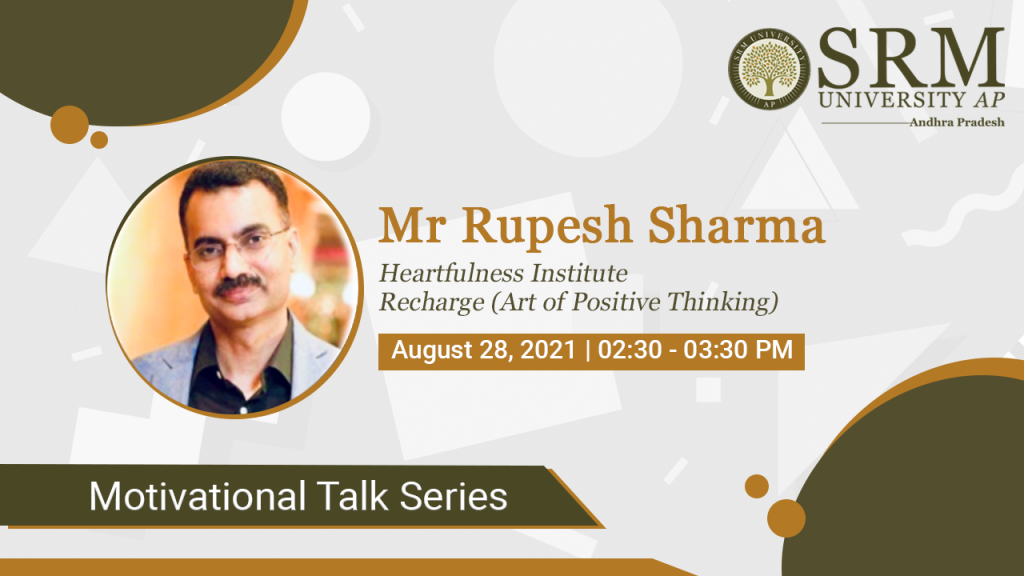 With the aim of providing holistic development to the students, the Freshmen Orientation Programme-2021 delivers a blend of Academic, administrative knowledge along with tips and tricks of good Mental Health, in collaboration with the Heartfulness Institute. The last session of their 3-day induction programme will be delivered by Mr Rupesh Sharma on August 28, 2021, at 2.30 pm. Mr Sharma will be discussing “Recharge-Art of Positive Thinking”.
With the aim of providing holistic development to the students, the Freshmen Orientation Programme-2021 delivers a blend of Academic, administrative knowledge along with tips and tricks of good Mental Health, in collaboration with the Heartfulness Institute. The last session of their 3-day induction programme will be delivered by Mr Rupesh Sharma on August 28, 2021, at 2.30 pm. Mr Sharma will be discussing “Recharge-Art of Positive Thinking”.
Mr Rupesh Sharma is associated with Heartfulness Institute since August 2014. He became a trainer in January 2018. He has done B. Pharma from Medical College, Amritsar and is currently the Vice President for United Biotech, Delhi. Mr Sharma has 25 years of experience in Pharmaceuticals Sales and Marketing. He has spent the last 15 years in top companies such as Apple Therapeutics, USV Ltd., Lark Laboratories India Ltd. etc. Mr Sharma has successfully conducted 50+ workshops so far on Science of Meditation, Compassion and Empathy, Happiness Series, Introduction to HFN Practices. Join the session on August 28, 2021, at 2.30 pm to master positive think with Mr Rupesh Sharma.
- Published in Events, Students Affairs Events
An Odyssey of Physics: 1D and 3D photonic crystals and their applications
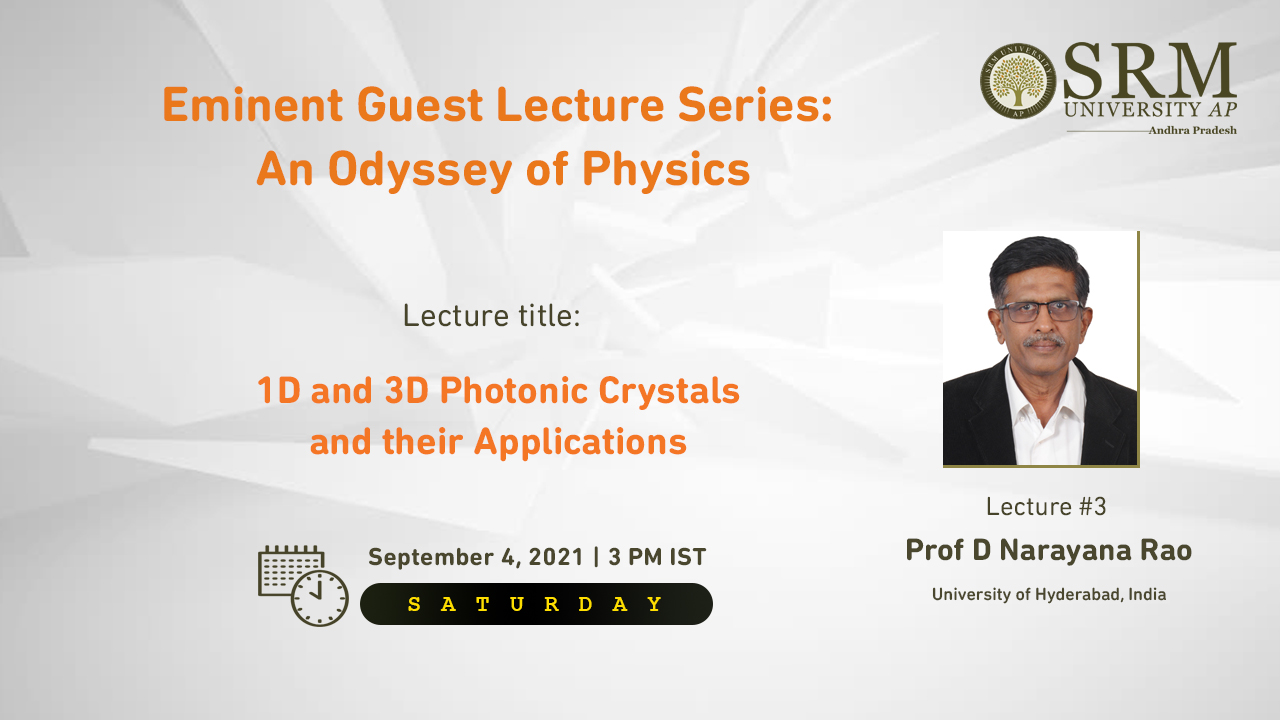 The third edition of the Eminent Guest Lecture Series: An Odyssey of Physics organised by the Department of Physics at SRM University-AP will be held on September 04, 2021, Saturday at 3.00 pm. The session will be engaged by Prof D Narayana Rao from the University of Hyderabad on the topic “1D and 3D Photonic Crystals and their Applications”.
The third edition of the Eminent Guest Lecture Series: An Odyssey of Physics organised by the Department of Physics at SRM University-AP will be held on September 04, 2021, Saturday at 3.00 pm. The session will be engaged by Prof D Narayana Rao from the University of Hyderabad on the topic “1D and 3D Photonic Crystals and their Applications”.
Abstract of the event:
There will be a brief introduction to the Photonic crystals, followed by our laboratory results. Our work mainly concentrated on optical field enhancement in both the 1D and 3D photonic crystals. Such strong local field enhancement is essential for reducing the high power laser requirements in nonlinear optics experiments. These photonic crystals have been prepared through various techniques like sol-gel, slow evaporation method and RF sputtering technique. Prof D Narayana Rao will show some results on surface-enhanced Raman studies and optical limiting and white light generation.
All are invited to join this lecture on September 04, 2021, at 3.00 pm to gain an insightful overview of 1D and 3D photonic crystals and their applications.
Register here:http://bit.ly/SRMAP_PhysicsSeries3
- Published in Departmental Events, Events, Physics, Webinars
Towards building a smartphone-based system for improving the efficiency of farms in India
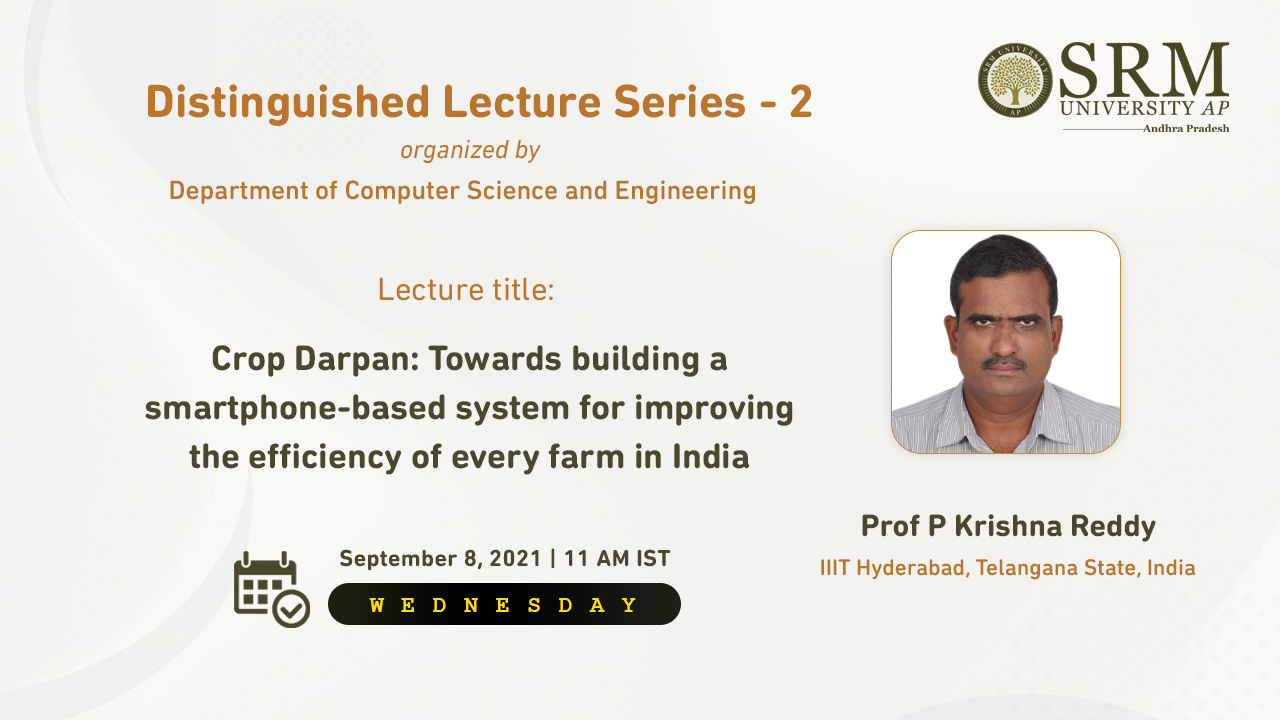 Despite the variety of traditional and IT-based agricultural information delivery approaches, the majority of Indian farmers are not acquiring or provided with actionable agricultural information in a timely and regular manner. A lecture titled “Crop Darpan: Towards building a smartphone-based system for improving the efficiency of every farm in India” will be organised by the Department of Computer Science and Engineering on September 08, 2021, at 11.00 am to address the issue of the lab to the land gap in agriculture. Prof P Krishna Reddy, from IIIT Hyderabad, will talk about the eSagu system, an IT-based farm-specific agro-advisory system field-tested on about 50 field and horticultural crops in hundreds of villages.
Despite the variety of traditional and IT-based agricultural information delivery approaches, the majority of Indian farmers are not acquiring or provided with actionable agricultural information in a timely and regular manner. A lecture titled “Crop Darpan: Towards building a smartphone-based system for improving the efficiency of every farm in India” will be organised by the Department of Computer Science and Engineering on September 08, 2021, at 11.00 am to address the issue of the lab to the land gap in agriculture. Prof P Krishna Reddy, from IIIT Hyderabad, will talk about the eSagu system, an IT-based farm-specific agro-advisory system field-tested on about 50 field and horticultural crops in hundreds of villages.
Since 2004, research efforts are being made at IIIT Hyderabad to investigate the building of IT-based agro-advisory systems to deliver actionable agro-advice to every farm field of India in a timely manner. In this connection, they have built the eSagu system and village-level eSagu system. They are also currently investigating the building of the Crop Darpan system. The Crop Darpan App is available for cotton and rice crops at Google Play Store and Apple App Store. In this talk, Prof P Krishna Reddy will share the experiences of building these systems and the future plans.
Biography of the speaker:
Prof P Krishna Reddy is the head of the Agricultural Research Center and a member of the Data Sciences and Analytics Center research team at IIIT Hyderabad, India. From 2013 to 2015, he has served as a Program Director, ITRA-Agriculture & Food, Information Technology Research Academy (ITRA), Government of India. His research areas include data mining, database systems and IT for agriculture. He has published about 189 refereed research papers which include 30 journal papers, four book chapters, and eight edited books. He is a steering committee member of the Pacific-Asia knowledge discovery and data mining (PAKDD) conference series and the Database Systems for Advanced Applications (DASFAA) conference series. He has delivered several invited/panel talks at reputed conferences and workshops in India and abroad. Since 2004, he has been investigating the building efficient knowledge agricultural knowledge transfer systems by extending developments in IT. He has conceptualized the notion of Virtual Crop Labs to improve applied skills for extension professionals. Currently, he is investigating the building of the Crop Darpan system, which is a crop diagnostic tool for farmers, with funding support from the India-Japan Joint Research Laboratory Program. The eSagu system, an IT-based farm-specific agro-advisory system, has got several recognitions including CSI-Nihilent e-Governance Project Award in 2006, Manthan Award in 2008 and has been a finalist in the Stockholm Challenge Award in 2008 and received PAKDD Distinguished Service Award in 2021.
Join this illuminating lecture on September 08, 2021, at 11:00 am and gain valuable insights into building a smartphone-based system for improving the efficiency of every farm in India.
Register here: https://srmap.zoom.us/webinar/register/WN_qITnmUdMQjqkvFSM9yGCzA
- Published in CSE EVENTS, Departmental Events, Events, Webinars
Advanced strategies for sustainable pavements
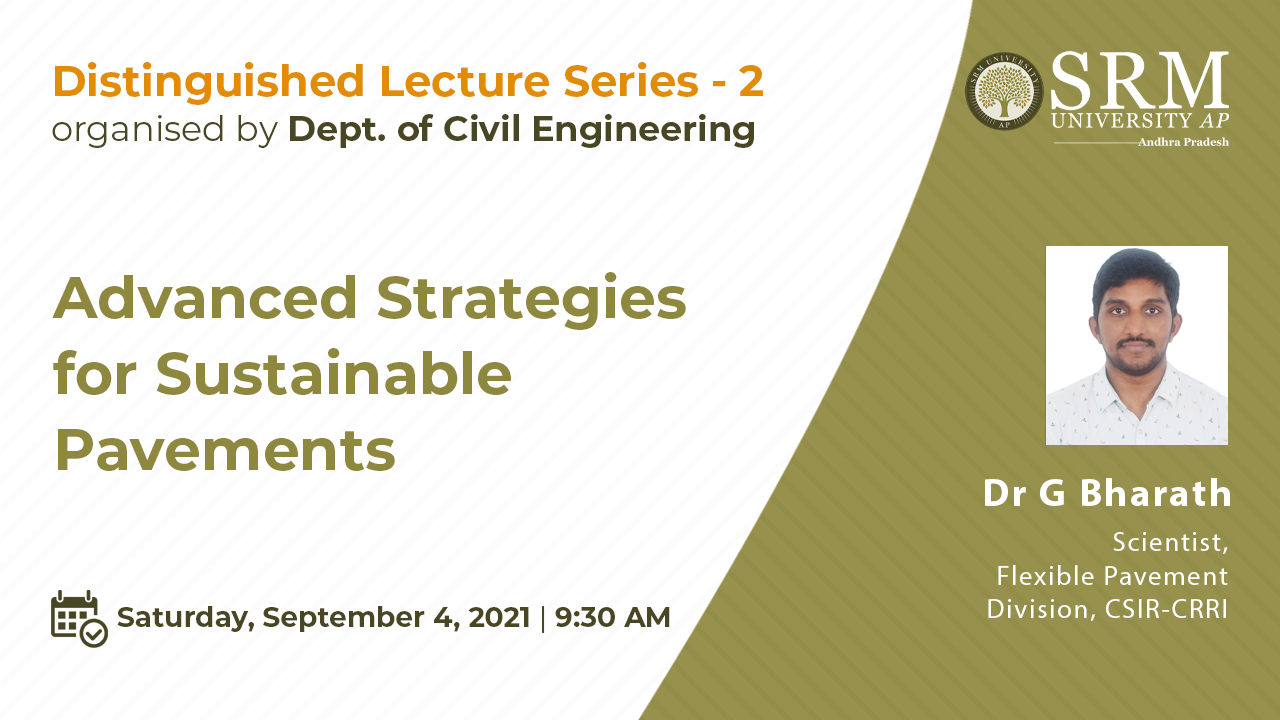 The second talk in the distinguished lecture series organised by the Department of Civil Engineering will be held on September 04, 2021, at 9.30 am. Dr G Bharat, Scientist, Flexible Pavement Division, CSIR-CRRI will deliver an engaging lecture on the topic Advanced Strategies for Sustainable Pavements. The lecture aims to cover topics like asphalt concrete recycling, composite pavements and utilisation of waste materials in pavements.
The second talk in the distinguished lecture series organised by the Department of Civil Engineering will be held on September 04, 2021, at 9.30 am. Dr G Bharat, Scientist, Flexible Pavement Division, CSIR-CRRI will deliver an engaging lecture on the topic Advanced Strategies for Sustainable Pavements. The lecture aims to cover topics like asphalt concrete recycling, composite pavements and utilisation of waste materials in pavements.
About the Speaker:
Dr Bharath is currently working as a scientist at CSIR-Central Road Research Institute (CRRI), New Delhi, in the flexible pavement division. He successfully completed more than 60 R&D, sponsored and consultancy projects in pavement engineering. He is also working as an assistant professor in Engineering sciences at CSIR-Academy of Scientific and Innovative Research (AcSIR).
Dr Bharath has diverse expertise in pavement engineering, covering pavement design, materials, and field investigation. He published more than 25 National and International Journals and Conference articles. He has made remarkable contributions towards drafting Indian pavement design guides such as IRC:37-2012 and IRC:58-2011. Currently, Dr Bharath is actively involved in an externally funded project, “Sustainable Road Pavements in High Altitude Regions Using Geosynthetics”, worth 109 lakhs, funded by G.B. Pant National Institute of Himalayan Environment, MoEF, Under Scheme: National Mission on Himalayan Studies.
All are invited to this educative session on September 04, 2021, at 9.30 am.
Register here: https://srmap.zoom.us/webinar/register/WN_r7ffChMJQKagfryiFp9LTg
- Published in Civil Engg events, Departmental Events, Events
Mr KK Doddapaneni to inspire students on National Sports Day-2021
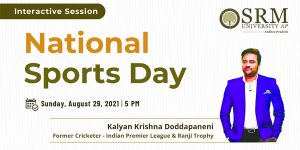
On the occasion of National Sports Day, the Department of Student Affairs has organised a webinar on the importance of Games and Sports in a Student’s life. Celebrated IPL and Ranji Trophy player, Mr Kalyana Krishna Doddapaneni, will deliver a special talk to inspire and motivate students on August 29, 2021, at 05.00 pm.
Mr Doddapaneni played in the Indian Premier League during the years of 2008-09 for the Deccan Chargers team. Prior to that, he played in the Andhra Ranji Cricket Team for 10 years and bagged 200+ first-class wickets. He has also played in vital tournaments such a Duleep and Deodhar Trophies. Mr Doddapaneni is currently working as a leading commentator for Start Sports. He is also the chairman of the Cricket Advisory Committee, Andhra Cricket Association. He has further established KK Global Cricket Academy in Andhra Pradesh with state-of-the-art facilities to promote cricket.
Sports are a crucial part of a student’s holistic growth and development. Games and sports provide great help in the development of mental health and physical fitness of the body. In addition, through participation in sports and games, a student attains various skills and confidence helpful for developing their personality.
Sports and games have several benefits for the students, such as it improves physical and mental health, empowers students with life skills, teaches time management and discipline, improves leadership and team-building qualities, teaches important life lessons such as Winning and losing and boosts self-confidence.
- Published in Events, Students Affairs Events

